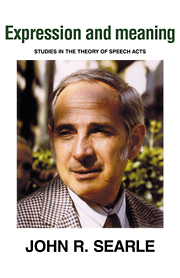3 - The logical status of fictional discourse
Published online by Cambridge University Press: 05 June 2012
Summary
I believe that speaking or writing in a language consists in performing speech acts of a quite specific kind called “illocutionary acts”. These include making statements, asking questions, giving orders, making promises, apologizing, thanking, and so on. I also believe that there is a systematic set of relationships between the meanings of the words and sentences we utter and the illocutionary acts we perform in the utterance of those words and sentences.
Now for anybody who holds such a view the existence of fictional discourse poses a difficult problem. We might put the problem in the form of a paradox: how can it be both the case that words and other elements in a fictional story have their ordinary meanings and yet the rules that attach to those words and other elements and determine their meanings are not complied with: how can it be the case in “Little Red Riding Hood” both that “red” means red and yet that the rules correlating “red” with red are not in force? This is only a preliminary formulation of our question and we shall have to attack the question more vigorously before we can even get a careful formulation of it. Before doing that, however, it is necessary to make a few elementary distinctions.
The distinction between fiction and literature: Some works of fiction are literary works, some are not.
- Type
- Chapter
- Information
- Expression and MeaningStudies in the Theory of Speech Acts, pp. 58 - 75Publisher: Cambridge University PressPrint publication year: 1979
- 60
- Cited by



